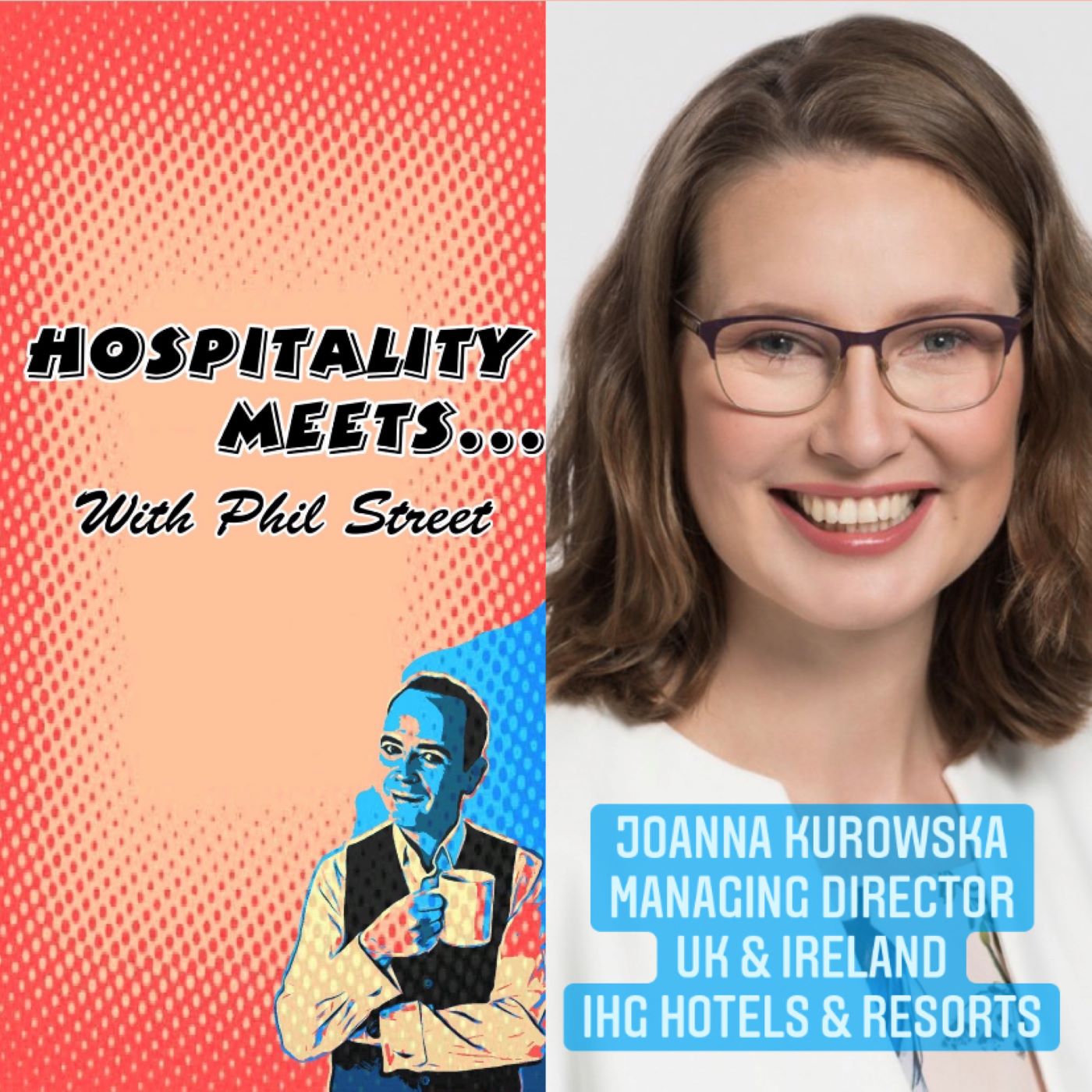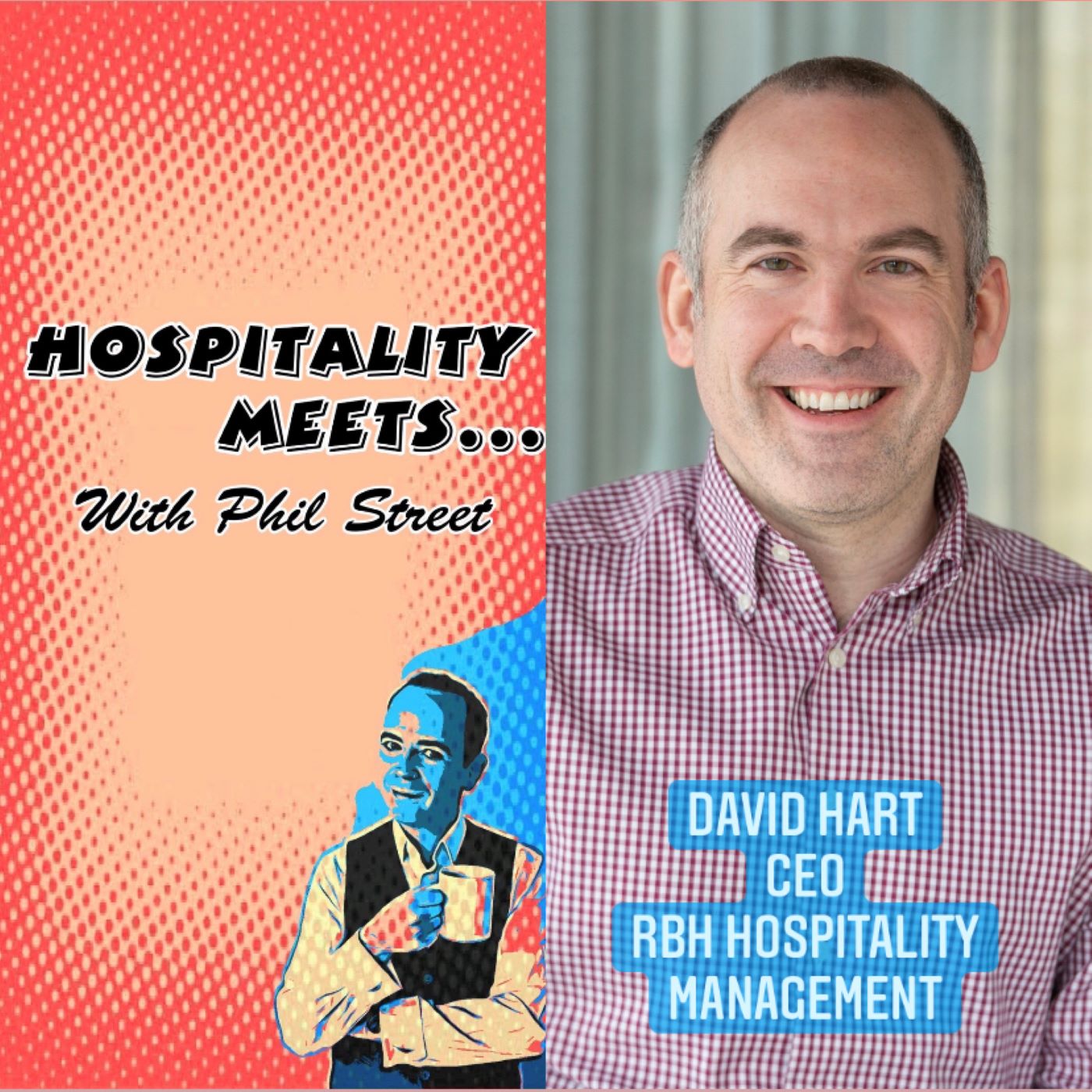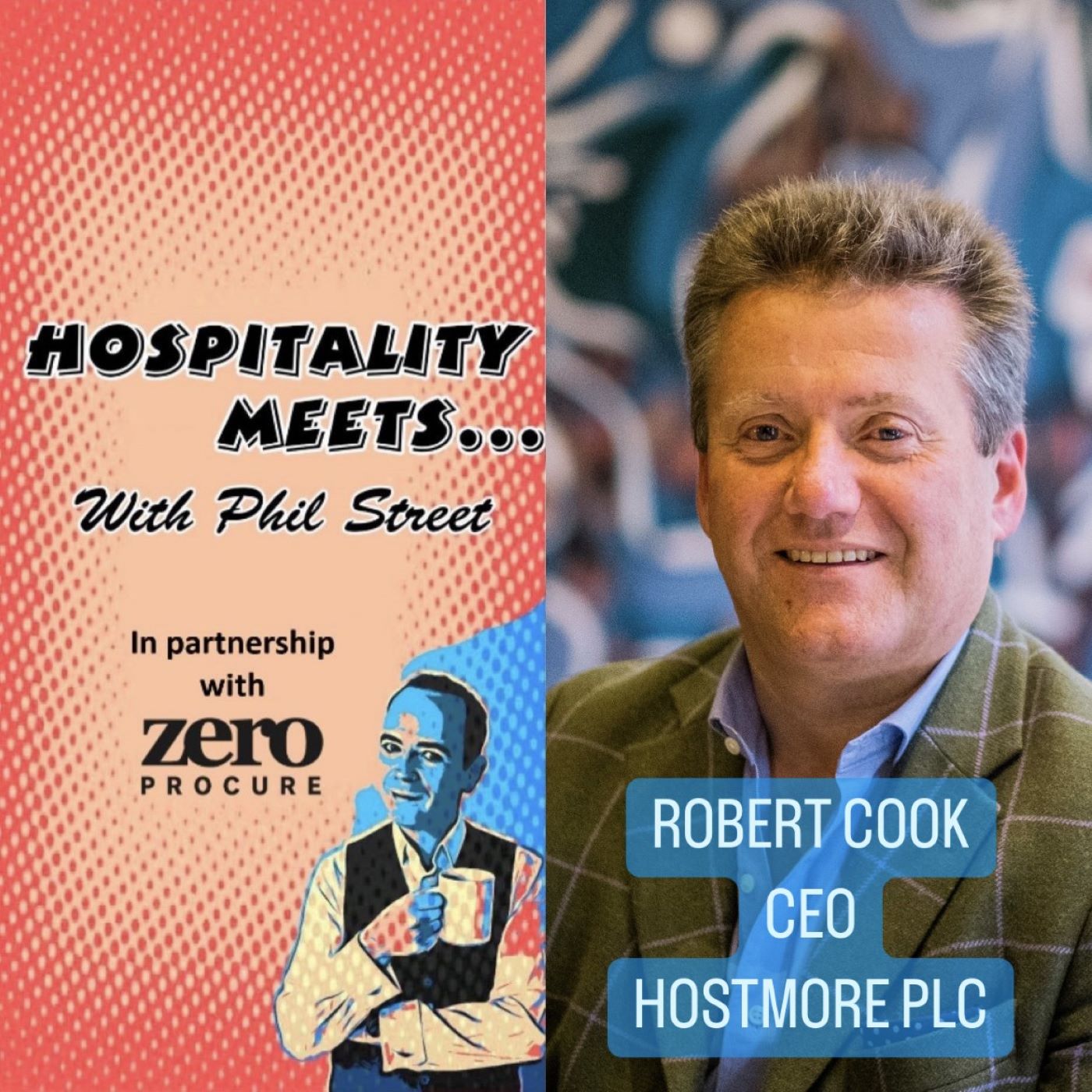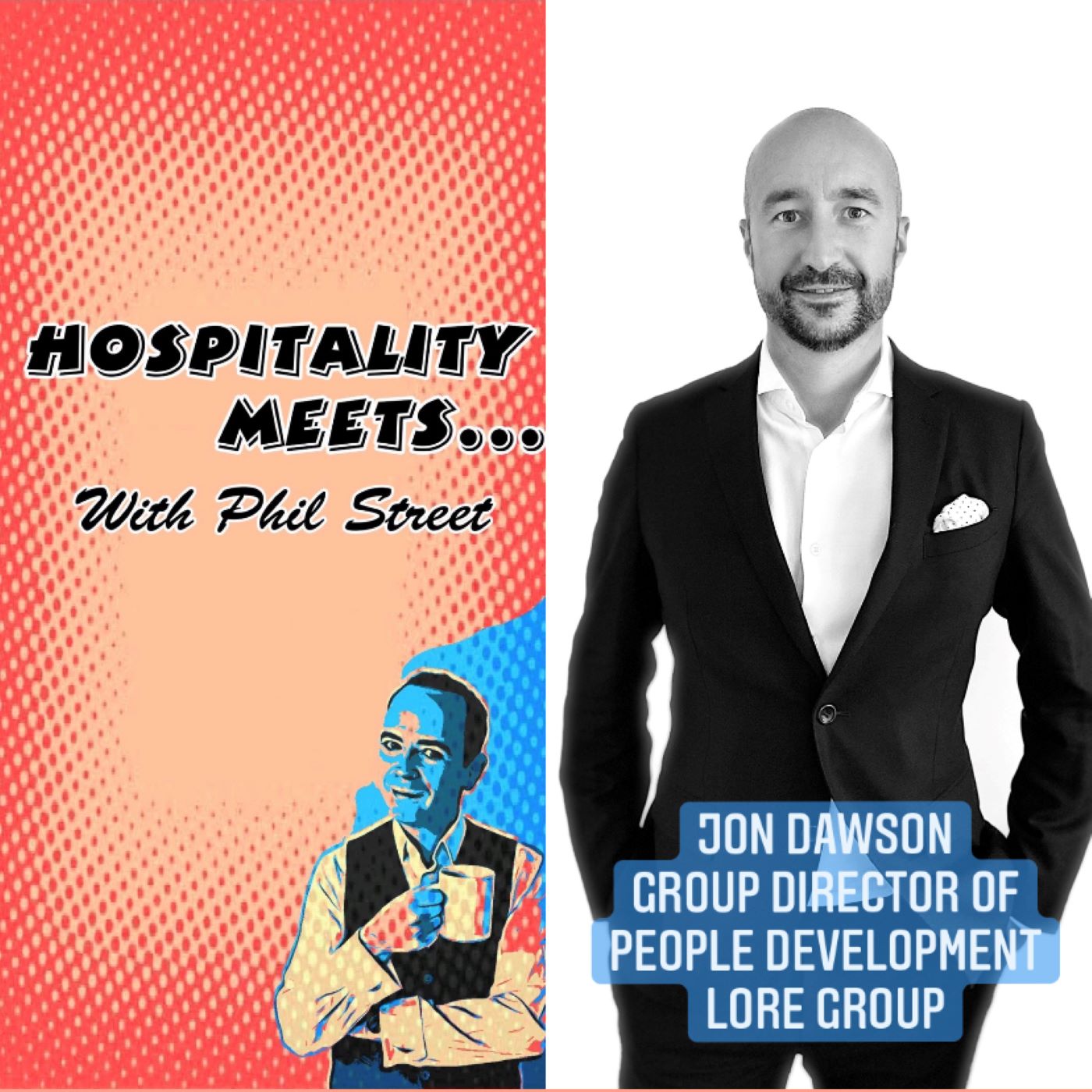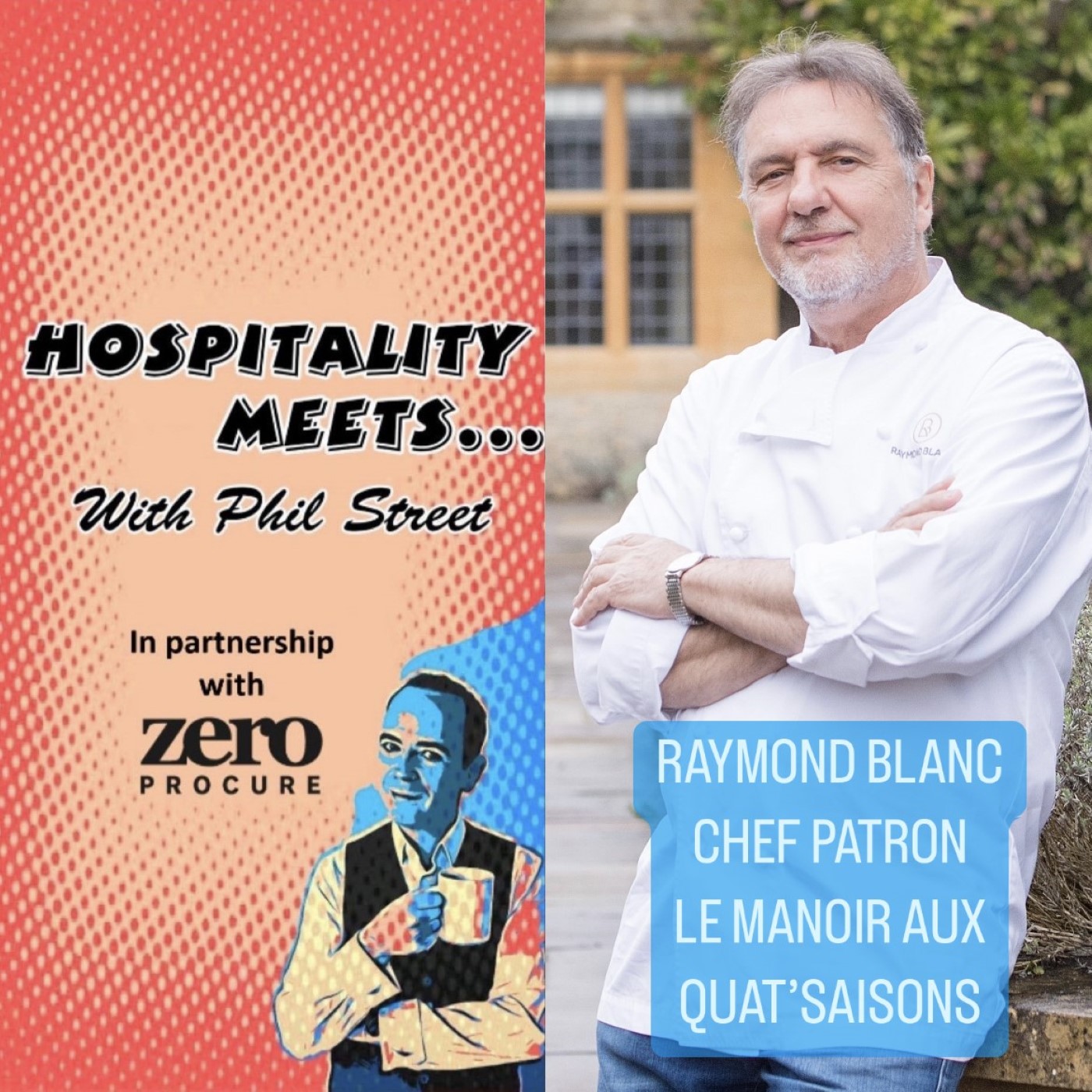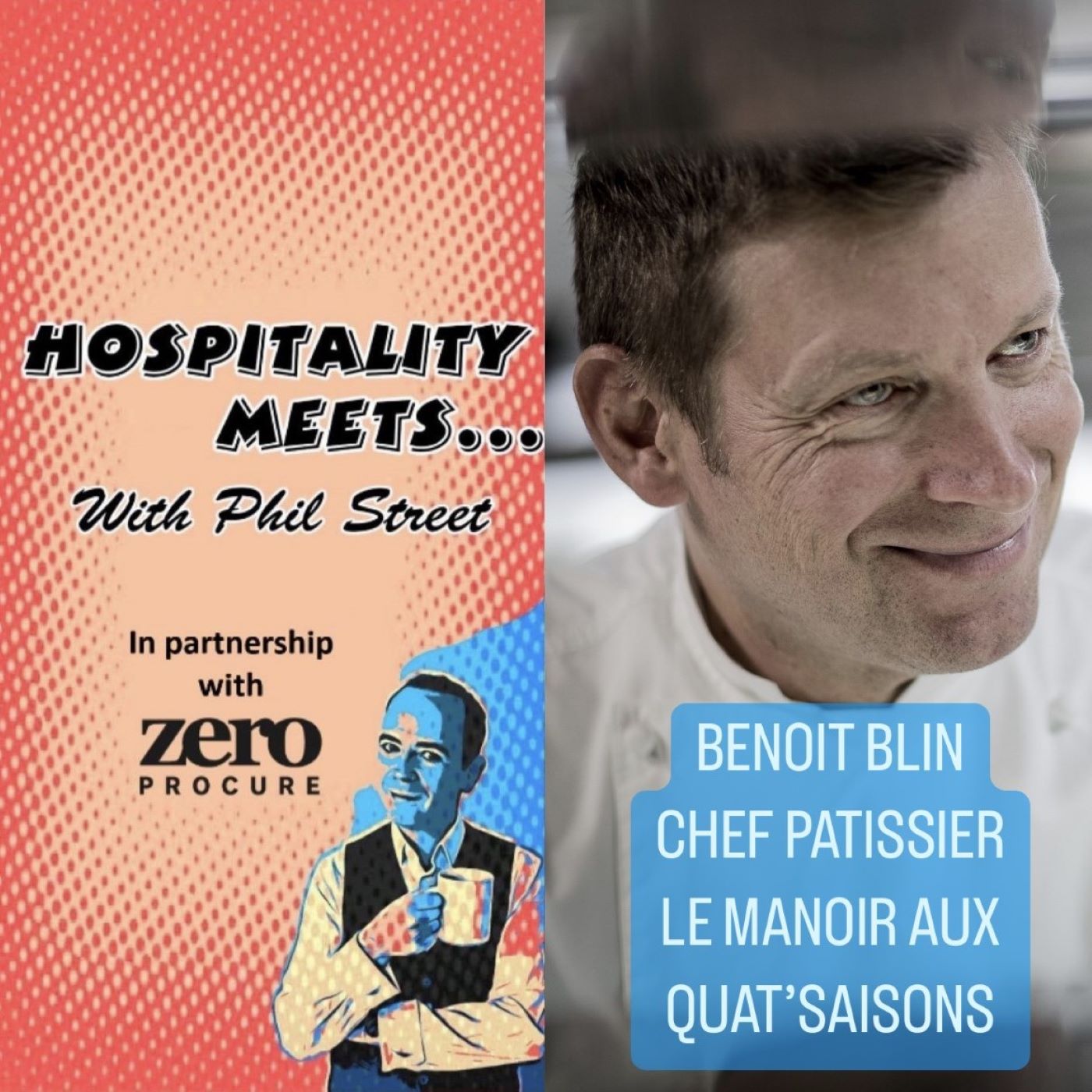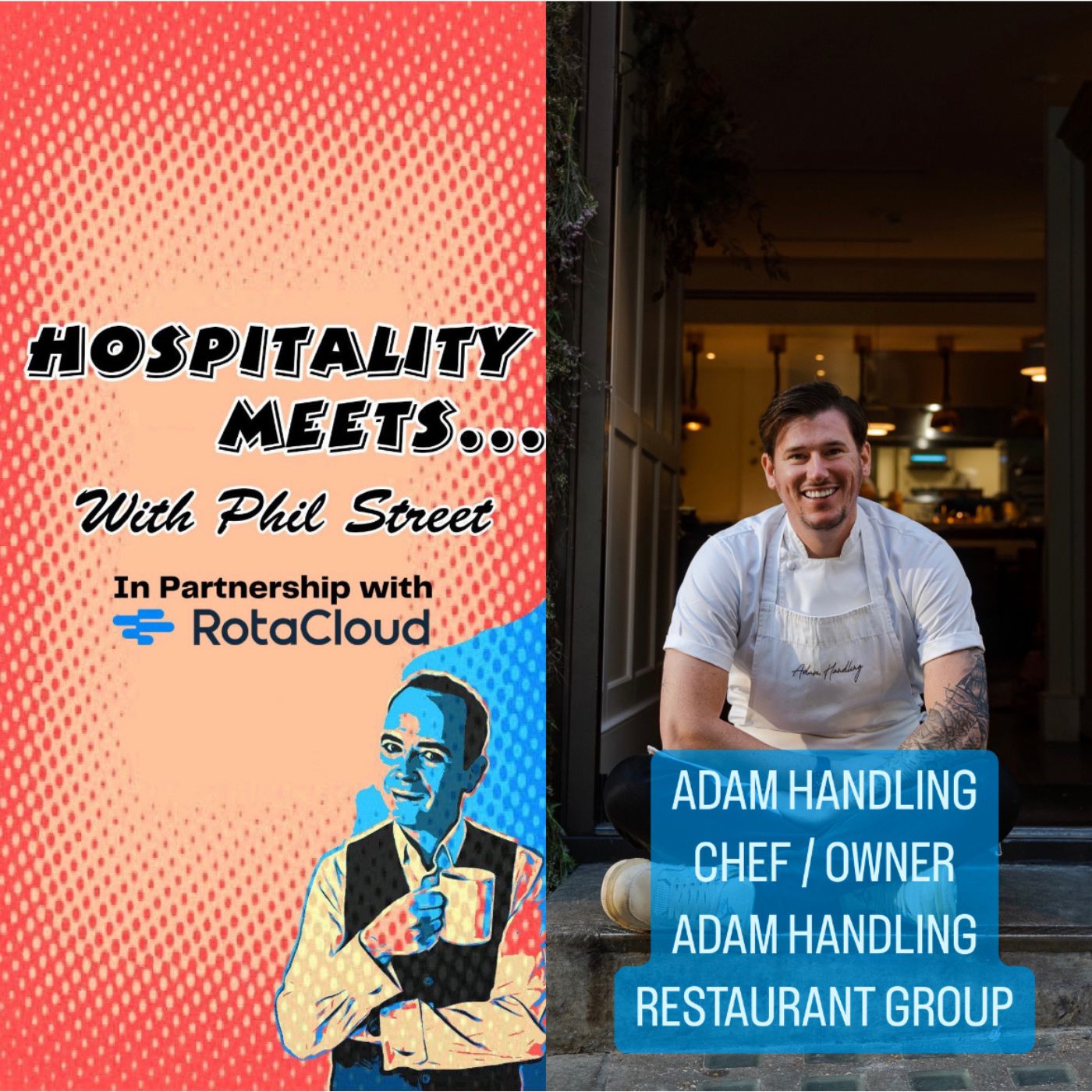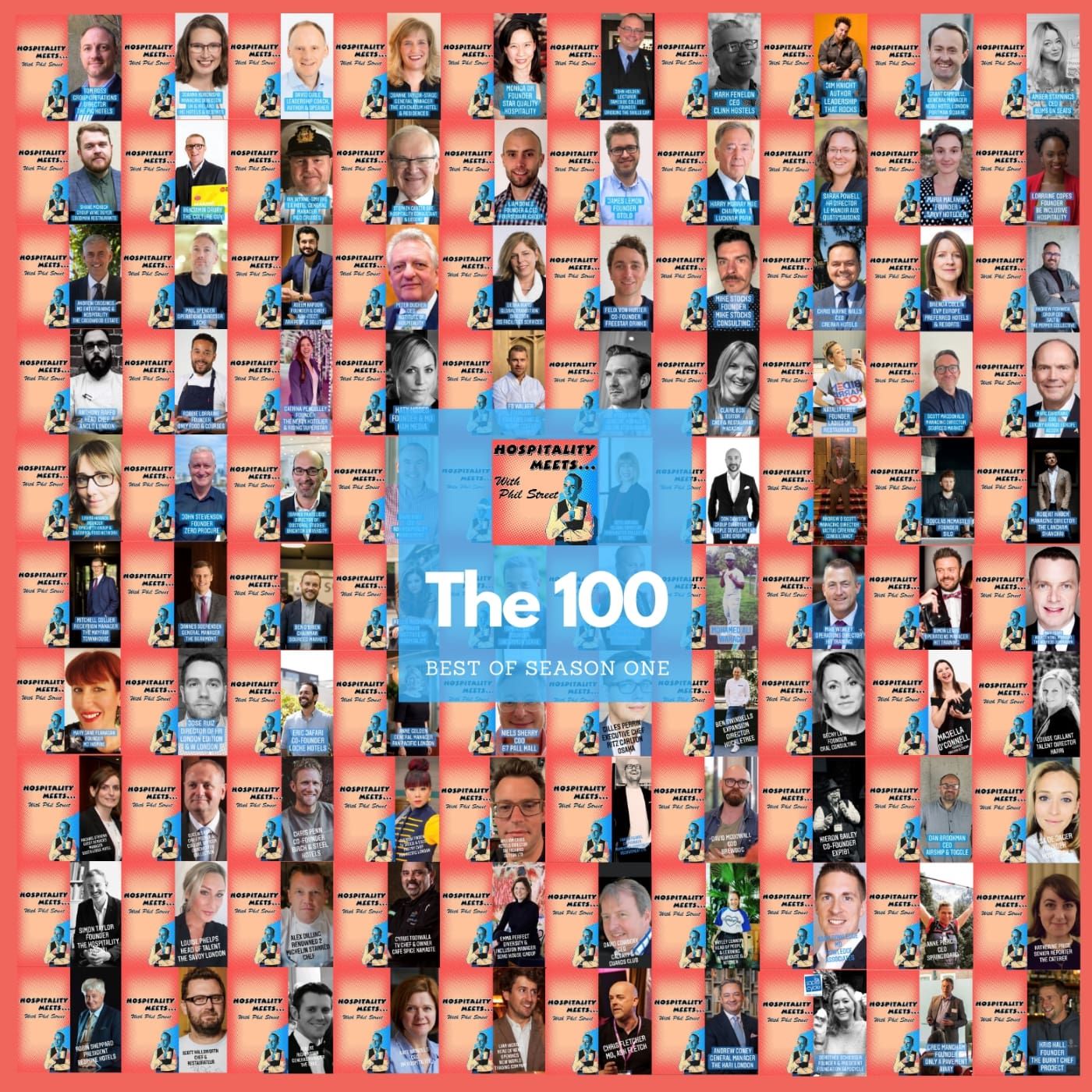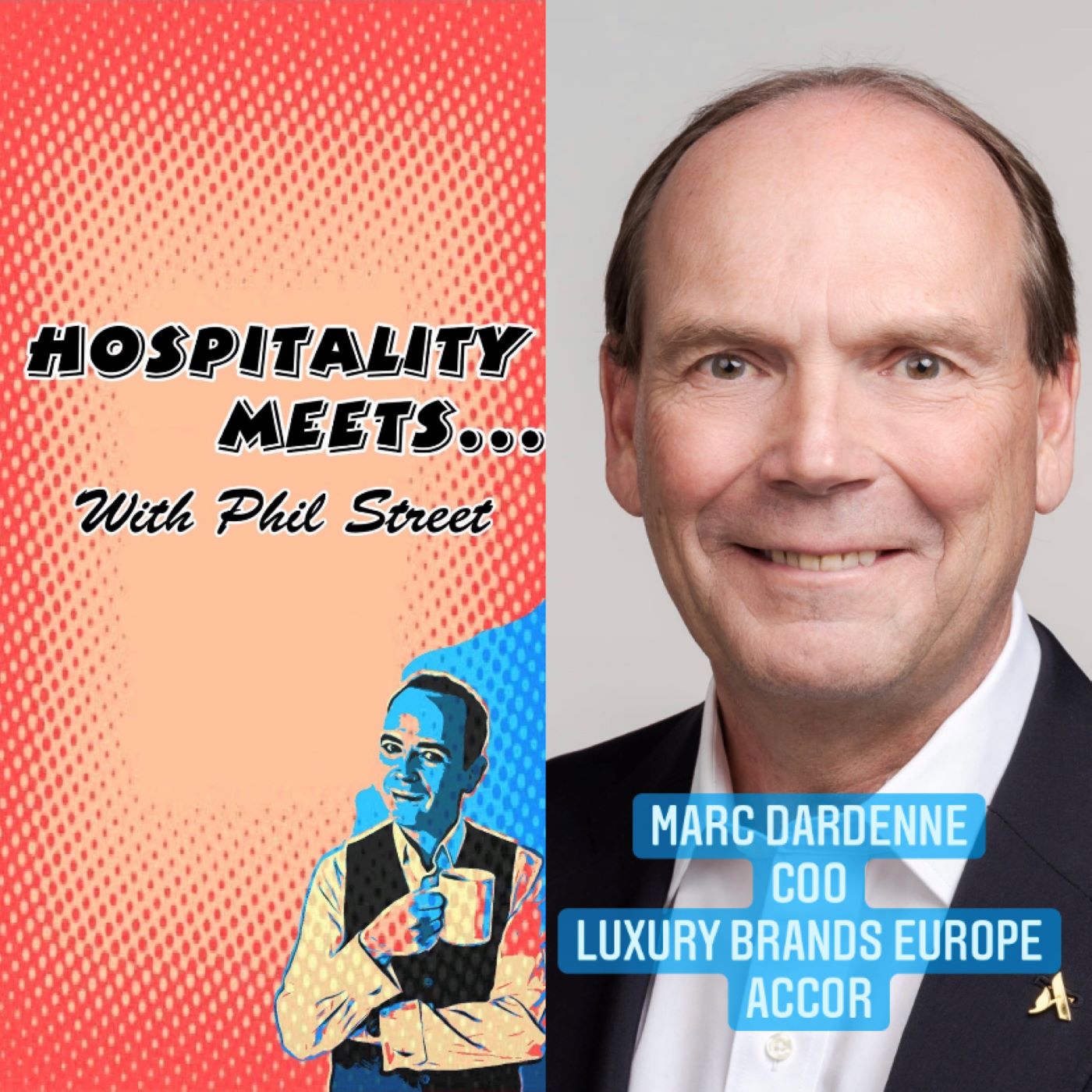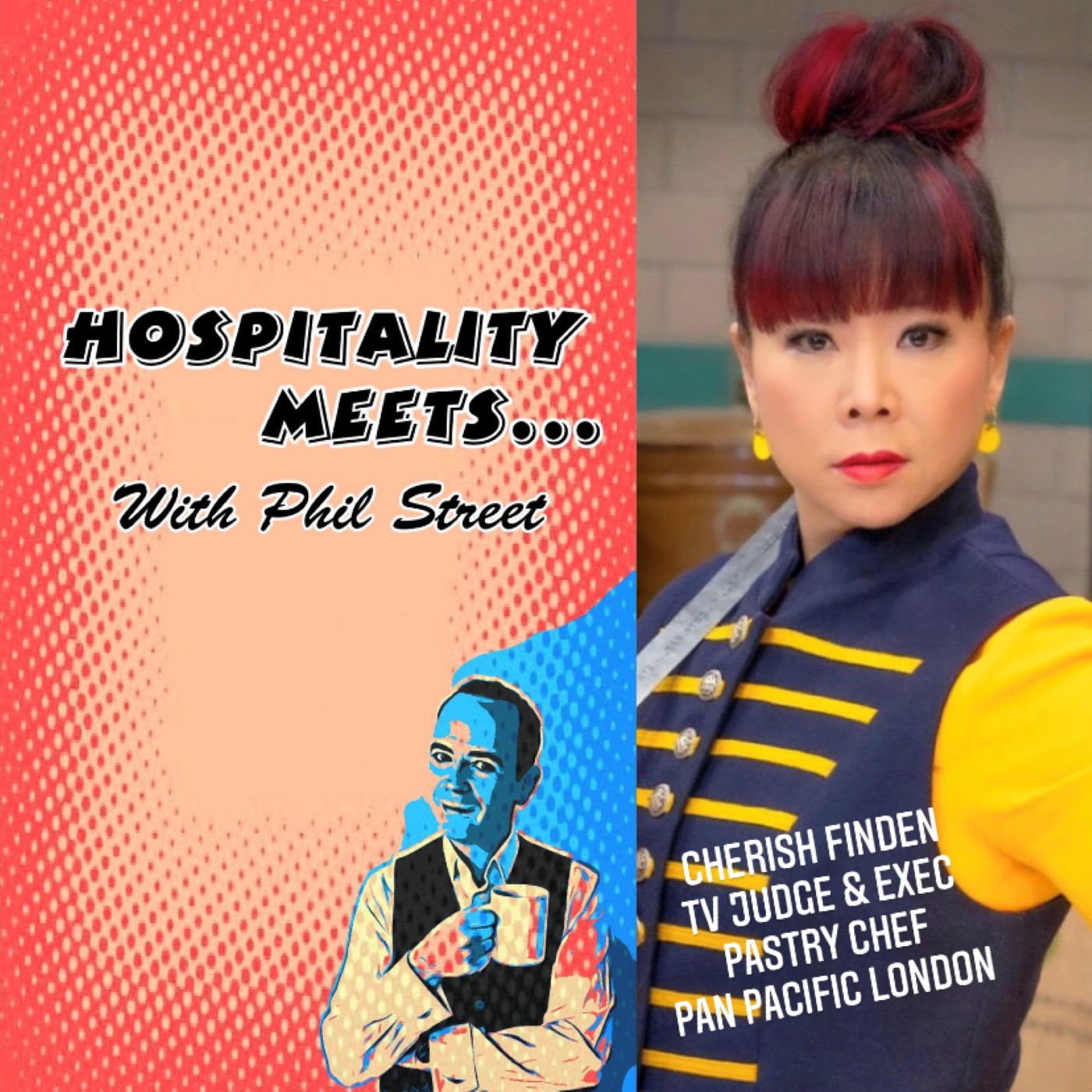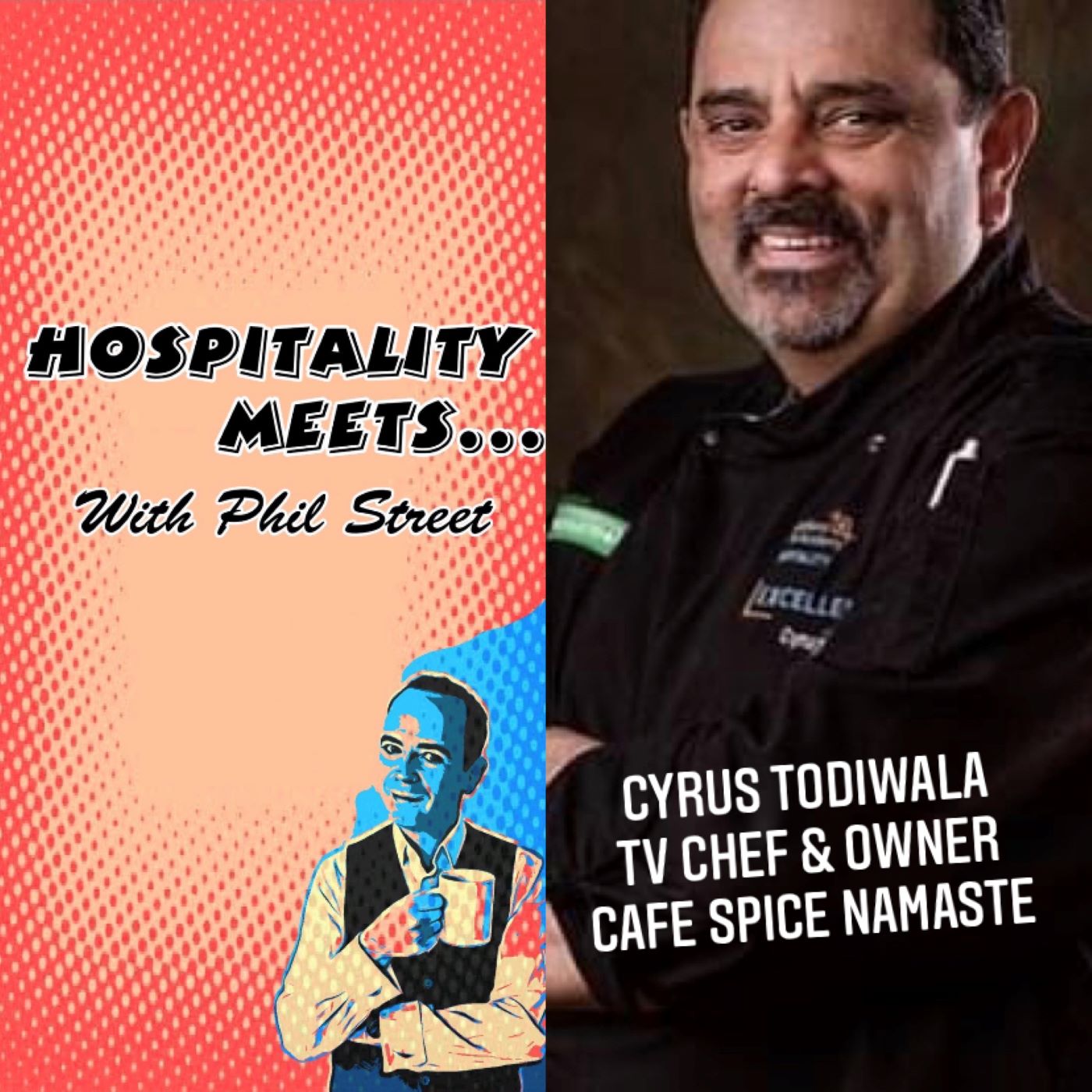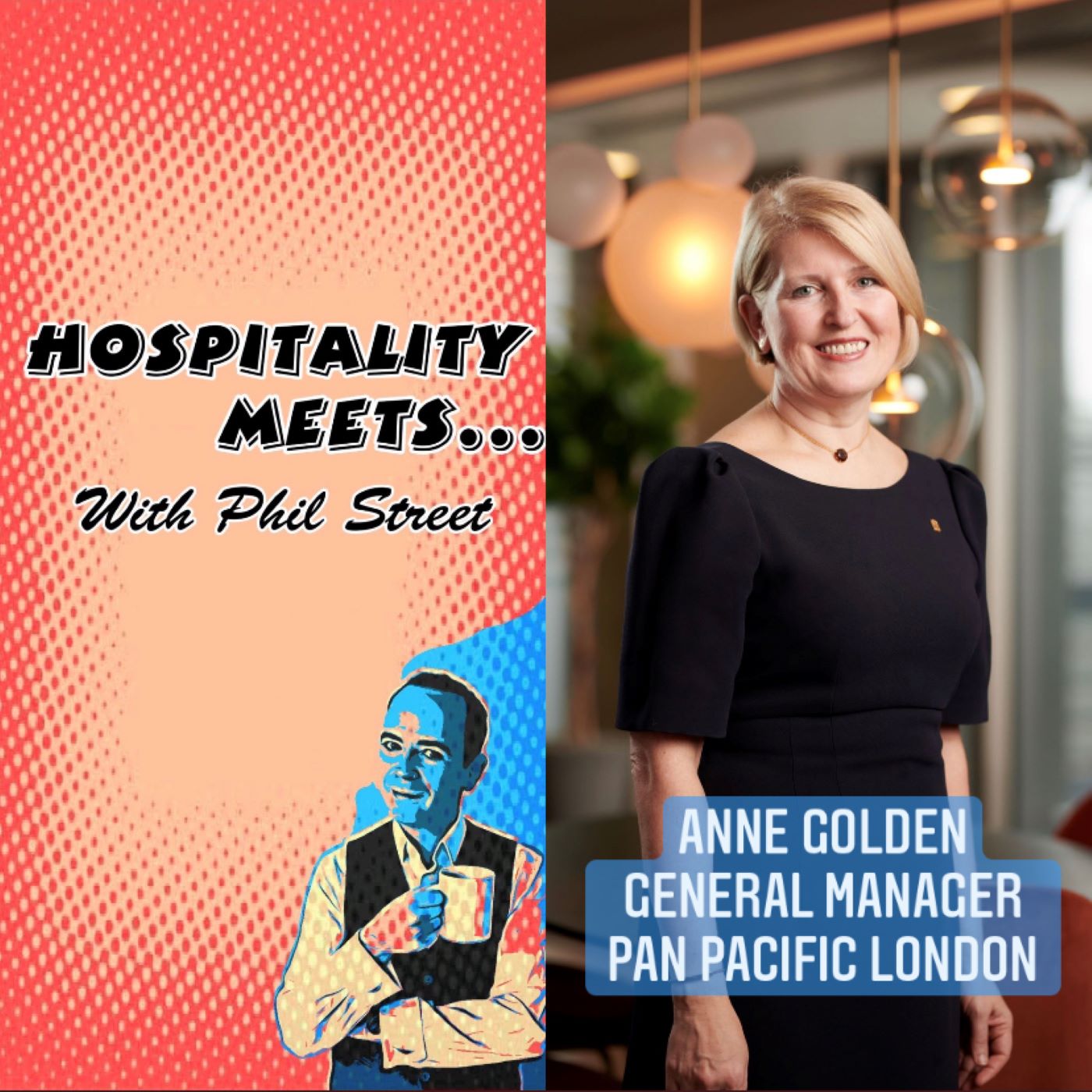#188 - Hospitality Meets Sally Abé - From the Kitchen to the Bookshelf

In this weeks Hospitality Meets, we have a very special guest - Sally Abé, renowned chef and author who has recently released her memoir - A woman's place is in the kitchen.
Throughout her career, Sally has worked at some of the most prestigious restaurants in the UK, including the Savoy, Gordon Ramsay at Claridge's, and the Ledbury. She's here to share her journey, from working as a waitress in golf clubs and bars to becoming a junior sous chef and eventually the head chef at the Harwood Arms, which topped the list of the top 50 gastropubs in 2020.
But Sally's story isn't just about her achievements in the kitchen. She's also an advocate for change in the hospitality industry, particularly when it comes to creating a more inclusive and supportive work environment for everyone. She'll be discussing the challenges she's faced as a woman in a male-dominated field, as well as the importance of valuing and nurturing your team.
We'll also be diving into Sally's experience writing her memoir, which she describes as "a manifesto for change in the professional kitchen industry". She'll share some of the funny and heart-warming moments from her career, as well as the tough times that have shaped her both personally and professionally.
So grab a seat at the table and join us for an insightful and inspiring conversation with the one and only Sally Abé. Trust us, you won't want to miss this one!
The Guest
Instagram - @littlechefsally
The Sponsor
Today’s episode comes to you in partnership with RotaCloud, the people management platform for shift-based teams.
RotaCloud lets managers create and share rotas, record attendance, and manage annual leave in minutes — all from a single, web-based app.
It makes work simple for your team, too, allowing them to check their rotas, request holiday, and even pick up extra shifts straight from their phones.
Try RotaCloud’s time-saving tools today by heading to https://rotacloud.com/phil
This podcast uses the following third-party services for analysis:
Podcorn - https://podcorn.com/privacy
Phil [00:00:00]:
And a huge hospitality meets. Welcome to Sally Abbey.
Sally [00:00:02]:
Thank you very much.
Phil [00:00:03]:
How are you?
Sally [00:00:04]:
I am good on this lovely sunny day. Yeah.
Phil [00:00:06]:
And we are stuck in the dungeon somewhere.
Sally [00:00:09]:
It feels like air conditioning.
Phil [00:00:10]:
Where's the air conditioning? The critical factor on this 27 or 28 degree day that we're in. But, yeah. How's life?
Sally [00:00:17]:
Good. Yes, all good. Just been very busy. The book came out two weeks ago, so just on the promotion trail at the moment.
Phil [00:00:24]:
Yeah. That would be pretty relentless, I would imagine.
Sally [00:00:26]:
Yes. Yeah. Lots, lots going on. Lots of appearances and interviews and stuff. So, yeah, all good.
Phil [00:00:31]:
Yeah, very, very good. Grateful for you taking the time to chat to me then, in the midst of all of that as well. But I think your journey will play quite a lot. There'll be a lot of inspiration for people in there, I think, as well. I have read your book, so I'm one of the lucky ones so far. But I will obviously kind of talk about the book as we go, because you're one of the. I suppose I've never done this before, whereby normally I talk to people about their journey, but they haven't automatically written a book about it at the same time. So that's kind of cool as well, before we kind of get stuck into the book, et cetera, et cetera.
Phil [00:01:04]:
Maybe just take us all the way back to the beginning. And how did you get into hospitality in the first place?
Sally [00:01:11]:
So I think I'd sort of worked in and around hospitality, you know, as a. Well, when first started, when I was at school, to be honest, I worked in the local golf club and then worked in bars and restaurants as waitress when I was much younger. And then the path to actually doing it full time was kind of accidental, really. I'd moved to Sheffield to live with my boyfriend at time and just got really into cooking at home and just really, really loved it and thought, you know, maybe there's something in this and I can make a career out of it. So I pursued it, basically, and, yeah, enrolled on a hospitality business management degree and then ended up coming to London as a placement and then never going back.
Phil [00:01:54]:
Yeah. The rest is history. Thanks very much. We'll call it a day. Nothing else to report, really. Where was your placement?
Sally [00:02:01]:
It was at the Savoy.
Phil [00:02:02]:
Okay. I mean, not a bad place to start.
Sally [00:02:05]:
Yeah. Yeah, exactly. Yeah. Definitely went in at the top, I think.
Phil [00:02:08]:
Well, but I suppose that's a sink or swim moment, I guess, as well, because you can go into an environment like that, and I'm making assumptions here, but, you know, at any age, that can be a daunting environment to go into if you've not got a lot of experience in that environment. How did you find it?
Sally [00:02:24]:
Well, I think the fact that I'd got a no experience at all kind of stopped it from being so daunting. You know, they say ignorance is bliss. I've got no idea what was going on. So I just rocked up there with my brand new set of victory locks, knives ready to go, and, you know, got asked of Bromwell's net of shalots on the first day, and I was like, what does that mean? We've met with a few eye rolls and. Yeah, but it just kind of picked up as I went along and threw myself into it, really.
Phil [00:02:51]:
Right, yeah. So did you. Did you have an immediate love for it when you walked in, or did you have to find your love?
Sally [00:02:58]:
No, I think I did. I think I never really got on with school so much, and I was always a bit naughty and I never really sort of found my calling. And when I got into the kitchen environment, I just really loved, like, the hustle and the bustle and the pressure and all the different people and the fact that it was just so hands on and you had to sort of think on your feet a lot. I think that I worked really well under those circumstances.
Phil [00:03:22]:
Right, so you were kind of. You were hooked.
Sally [00:03:25]:
Yes. Yeah, pretty much, yeah, yeah, yeah.
Phil [00:03:26]:
So what happened next? How long were you there and where did you progress to?
Sally [00:03:30]:
So, I was at the Savoy Grill until the Savoy closed for its big refurb in December 2007. Right. So they moved me. Yeah, I know.
Phil [00:03:40]:
Feels like yesterday.
Sally [00:03:41]:
Yeah, I know. It's crazy, isn't it? Yeah. They moved me over to Gordon Ramsey carriages, so I started there in January 2008. Sort of cut my teeth there, really? I was there for just about two years and, yeah, that was kind of the basis of where I learned to cook. You know, the Savoy was kind of. I was there for six or seven months before it closed, but obviously I'd got literally no idea what I was doing, so it was more just sort of getting used to the, you know, the kitchen environment and the hours and the way of working and everything. And then Claridge's is where I started to, like, really learn how to cook.
Phil [00:04:13]:
Right, yeah. Clarisses was actually my first fine dining experience in London.
Sally [00:04:17]:
There you go.
Phil [00:04:17]:
Yeah, just drop that in there. Trying to think when that would have been. That would have been 2004. So predating your time there, but, yeah. So what was your role, official role at that time, then? At Claridge's?
Sally [00:04:29]:
Well, when I started there, I was a commie and then moved my way up to, I think I was like, senior chef to party when I left. So, right and across.
Phil [00:04:38]:
How long were you there?
Sally [00:04:39]:
Two years.
Phil [00:04:40]:
Two years?
Sally [00:04:40]:
Yeah. Yeah, yeah.
Phil [00:04:41]:
So that's, I suppose, a kind of natural progression.
Sally [00:04:44]:
Yeah. I mean, I was always the kind of person who would push very hard and really wanted to sort of get onto the next section and do the next thing and learn the next skill. So, yeah, I mean, I think two years is quite a short space of time, but I'm very determined.
Phil [00:04:59]:
How do you marry the, I suppose, the desire to push on versus the, I suppose, the need to consolidate learning? Because this is something that I see quite a lot of. There's no shortage of people who want to crack on, but I think it's one thing to want to crack on, but you've got to get a base level of knowledge and skill under your belt.
Sally [00:05:23]:
Yeah, definitely. You've got to learn to walk before you can run. Right. And I certainly wanted to run, and I think when I left Claridge's, I thought I knew it all and then got brought back down to earth with a bang in my next couple of positions. And I think in a lot of restaurants, you might have been the source chef at your previous restaurant, but in your new restaurant, you get stuck back down at the beginning, so you start again, because, you know, it's a whole new team, it's a new menu, it's new everything. So you've got to learn it from the bottom again. I don't think it's until, really, you've got probably five years experience under your belt that you can really be expecting to sort of go in at a more senior level, because you might know how to do everything perfectly at one restaurant, but it's not the same at another restaurant. And you need to learn the way their way of working and how.
Sally [00:06:12]:
How they do things. You know, there's more than one way to, well, skin a cat or boil an egg, I suppose not add a.
Phil [00:06:20]:
Menu with a skin cat. One.
Sally [00:06:21]:
No, me neither. I don't really want to.
Phil [00:06:24]:
So where did you go? Where was the next place? Next stop after Clarissa.
Sally [00:06:28]:
So the next stop is a restaurant that I won't name because I've talked a lot about it in the book and for legal reasons, can't really say, but, yeah, had a pretty gruesome experience there over four months. So quickly left, moved on, and then moved over to the library.
Phil [00:06:45]:
Yeah.
Sally [00:06:46]:
And, yeah, was at the library for five years.
Phil [00:06:47]:
These are some places you are working your way around.
Sally [00:06:51]:
Yeah, for sure. You know, I always wanted to be in, you know, really high end places and places I could learn a lot. And, you know, I owe most of what I know and most of my career to Brett and the Ledbury and then obviously the Harwood arms after, which is also by Brett Graham. So I spent a total of almost ten years working for him. So, yeah, good stab of time.
Phil [00:07:13]:
Yeah, for sure. And actually, I had written a question to ask you around where. Where your kind of early influences came from. It sounds like Brett was a massive part of that.
Sally [00:07:23]:
Yeah, 100%. You know, I think Brett's obviously got a phenomenal mind for food and dishes, but also for business as well. And I think he was always happy to impart all of his knowledge on his team, not just the food stuff. So, yeah, I owe him a lot.
Phil [00:07:40]:
Yeah. And your progression with him, what did you start as and what did you finish as well?
Sally [00:07:45]:
So I started a chef to party at the Leadbury, and then, I mean.
Phil [00:07:48]:
And that was the same as before.
Sally [00:07:50]:
Back to the grindstone, as it were, pretty much, yeah. And then, like, I was. I don't know, they didn't really do labels so much at the Leadbury, but. But by the time I left, I was probably equivalent to junior sous chef, essentially. Yeah. So I was doing a lot of the, you know, running the kitchen jobs as well as being on the section and. Yeah, had a lot of responsibilities there when I left, so, yeah, it's a good long time.
Phil [00:08:14]:
Yeah, absolutely. And two, Messelin starred at this point.
Sally [00:08:18]:
It was two then. Yes, three now. Just one of the two when I started. Yeah, I know. It's great to see them doing so, so well again after having been closed for a couple of.
Phil [00:08:27]:
Yeah, indeed. But that almost, I think, feels a little bit like that was a refresh time, perhaps, for him as well, to regroup over again.
Sally [00:08:36]:
You know, I think, you know, having that time off, you know, certainly gives you time to think about what it is you really want and what direction you want to go in. You know, Brett's very into. He's not just a restauranteur, like, he owns a lot of livestock as well, and he's very passionate about farming and sustainable farming. He makes, like, a rapeseed oil from the grains, same grains that he feeds to his animals. So it's all like, full circle farming, and I think that's very, very important that he can put those meats on in his restaurant and it all gets very joined up so nothing goes to waste and there's no air miles involved, essentially.
Phil [00:09:13]:
Yeah. Well, I mean, that's a front and center thing right now, isn't it? But that's a podcast for a totally different forum. But I think maybe in these two roles as well, the place that shall not be named previously. And then Brett also probably highlights to me that you can be lucky or not. Right, in terms of where you go and who you learn from or don't learn from as it happens, and what a massive part that can play in establishing somebody's love for the industry or not.
Sally [00:09:47]:
Yeah. 100%. If you get into a bad kitchen or bad restaurant, some people leave the industry as a result of it. You know, I've had lots of messages since the book came out and the Guardian interview I did just before it came out from people reaching out, saying, you know, I'd worked in this place or that place, and, like, after that, I just couldn't do it anymore. And it's. It's really sad to see that, you know, we've lost, I'm sure we've lost a lot of really capable, excellent people as a result of mistreatment, and that. Yeah. Makes me very, very sad.
Phil [00:10:18]:
Yeah. And that's just a basic human principle that we should not be having to deal with.
Sally [00:10:23]:
You'd think so.
Phil [00:10:25]:
When you say it out loud, it sounds ludicrous. Right. But here we are. It's regrettably still out there in some places, but I think the key thing, and maybe this is around your journey into writing about your experiences as well, is that, you know, to, what's the phrase? Evil flourishes when good people do nothing.
Sally [00:10:46]:
Yeah.
Phil [00:10:47]:
And almost like there's this, I suppose, this call to arms for those of us who do care to. Yes, call it out, but I suppose make sure that people get educated, that that's not the norm.
Sally [00:11:01]:
Yeah. Yeah.
Phil [00:11:01]:
Because sometimes I feel like that's what people think the norm is.
Sally [00:11:05]:
Yes. Yeah. And I think that's why a lot of people shy away from hospitality, unfortunately. And, you know, for me, it's about being the change that I want to see and sort of trying to be outspoken about that, not just quietly doing it, but saying, hey, guys, like, hey, everyone, it doesn't have to be like this. Let's, you know, let's make it a change and make it, you know, welcoming, respectful, diverse place to work, and it works so much better and everybody's happier when that's the case.
Phil [00:11:34]:
Yeah. Why don't. I mean, it just makes common sense.
Sally [00:11:38]:
It does what it does to you and I.
Phil [00:11:40]:
Indeed. So let's conclude your journey, as it were. So you left Brett junior Sue ish, we'll call it. What happened next.
Sally [00:11:50]:
So I actually took a little bit of a break from the kitchen for a year and a half after that. Yeah, five years. The library was amazing, but it definitely took its toll on my body and my brain. So I went and worked for a recipe website called great British Chefs. So did, like, recipe testing and development and food styling and stuff like that for them, which was. It was really interesting, actually. I did enjoy it, but after 18 months, I just started to get itchy feet and missed the, you know, the lull. Not the lull, the pull of the kitchen and the pace of the kitchen.
Sally [00:12:22]:
So I actually went to work for Phil Howard at Ellison Street.
Phil [00:12:25]:
I mean, you're dropping some nibs. We've had Phil on the shore as well.
Sally [00:12:29]:
Have you? Yeah. I mean, Phil is just amazing. Like, his. The way that he thinks about food and ingredients is just. Yeah, I just find it very romantic the way Phil cooks. Just, like, the love and care that goes into it. Yeah, I mean, he's just such an elegant person. Like, I've got a huge amount of respect for him and I was only with him for a short time, which is quite bittersweet for me because I'd always wanted to work for Phil.
Sally [00:12:53]:
But, you know, I did learn a lot in the 910 months I was there. But then the head chef job opportunity came up at the Harvard arms and I just couldn't turn that down. So. Went over to the Harvard?
Phil [00:13:07]:
Yeah, yeah, yeah, yeah. But, I mean, these are your career so far to this point. Now, you're obviously making a name for yourself, but these people are like, they're so formative, aren't they, in terms of your direction, maybe even the drive they give you beyond your own drive and these sorts of things.
Sally [00:13:26]:
Yeah, definitely. You know, I think it's. It's important to have role models and I think it's, you know, I mean, it's a bit sad for me that there weren't really very many women to look up to at that period in my life. But there were a lot of, you know, that era of chefs is kind of like the golden era of chefs. Wasn't it? Like, you know, when being a chef first became sort of cool and people like the restaurant scene in London and certainly the UK was starting to really explode and, yeah, it was just important to me to work for the best so that I could try and be the best myself.
Phil [00:14:00]:
Yeah, yeah. Absolutely. There's another saying, isn't there, around you're the sum of the five people you spend the most amount of time with.
Sally [00:14:08]:
I've not heard that before.
Phil [00:14:09]:
So if you're spending a huge amount of time with somebody like Phil Howard, you're going to undoubtedly take something from him in that time. And I think he's the sort of guy that willingly gives it 100%.
Sally [00:14:22]:
Yeah, yeah. He's happy to pass on his knowledge and teach others. Yeah.
Phil [00:14:27]:
He's also responsible for. I'm not going to make this podcast about Phil Howard, by the way, but he's also responsible for one of my favourite quotes that I've ever had on this show, which was, it's amazing how hard people will work for you if they're happy.
Sally [00:14:39]:
There you go. Yeah, exactly.
Phil [00:14:41]:
Yeah, yeah, yeah.
Sally [00:14:42]:
I think that's very, very true.
Phil [00:14:44]:
Yeah, absolutely. And, you know, look, we're realists as well. You can't have perfection every single shift of every single day of your working life. That's just, you know, that's unreasonable to expect that. But you can at least make the vast majority of them, you know, the least of the things that you can do is get out of people's way and let them flourish.
Sally [00:15:04]:
100%.
Phil [00:15:04]:
Yeah, yeah, absolutely. I just want to rewind slightly back to your experience on great british chefs. How did that come about in the first place? Was that just.
Sally [00:15:15]:
Yeah, it was just a bit of. I just took a punt and sent them an email and said, hey, like, I'm looking for a job. And they literally emailed me back the next day, like, can you come in for an interview? And I was just like, oh, my God. And it was just perfect timing, really. They were looking for somebody to do exactly what I was looking to do. So they basically expanded and they were looking for somebody with the technical knowledge to be able to help with all the recipes that they were publishing, and they didn't have that, so. And they basically were looking for that job at that exact time that I send that email. So it was just really good timing, really? All round.
Phil [00:15:49]:
Yeah, yeah, absolutely. But I mean, these. These things can just happen sometimes, can't they? And that website actually is. I'm not a chef, but I am a passionate amateur chef. I'm the master of my own kitchen, as it were, which is, you know, has a maximum capacity of about four people. But that website has been responsible for many a dinner party at my house. Yeah. Because it's just.
Phil [00:16:13]:
It's just. It's exactly the sort of thing that I get inspired by is seeing a. All of these names from the industry, you know, offering up some insight into the types of things that they cook, but also making it accessible for somebody like me who wants to push himself a little bit in my own kitchen to produce really excellent food.
Sally [00:16:33]:
Yeah, yeah, definitely. I think that's what makes that website quite unique.
Phil [00:16:37]:
Yeah, absolutely. So back up to speed. Head chef here at arms.
Sally [00:16:41]:
Yes? Yeah, yeah, so, yeah, this is your.
Phil [00:16:43]:
First official head chef?
Sally [00:16:45]:
This is my first head chef roll, yes. So took over there in 2017 and, yeah, just cracked on with it, really. And I really wanted to, you know, it was the first time that I'd got the reins and I really wanted to make it my own and put my stamp on it and my mark on it, and, you know, I did that and it got very widely recognized and we, you know, so proud of what the team and the food that we were and the drinks and everything that we were doing at the time. Yeah, it was a really special place and it was real honour to be in charge of it and running every day. I mean, it's still hard. Don't get me wrong, you know, the hours never got easier and, you know, there's always challenges that come with working in an independent restaurant and also a 200 year old building. There's millions of things that can go wrong, but, yeah, we. I think it was hard to start off with because I was learning how to be a head chef for the first time and, you know, finding my feet.
Sally [00:17:42]:
And then the team was a bit rocky for a while, just finding it hard to keep staff, but, you know, eventually I managed to sort of stabilize it and then we were able to sort of elevate the offering and, yeah, we managed to get to number one in the top 50 gastropubs in 2020, which was, you know, an amazing achievement. Something that I'd said to Brett, like, when I took over, I was like, I want to win that. And he's like, you will, you will. And then, yeah, within three years, I'd managed to. To get to the top. But, yeah, it was just a shame Covid came in.
Phil [00:18:12]:
That's the understatement of the year. It's a little bit of a shame. Yes. No, but, you know, I suppose we can maybe all now look back on that period and what's meant to be is meant to be, right. And it was pretty bloody awful. I think that's without question for anyone, really, that touches hospitality as their career, but also, you know, can be a really excellent, reflective time to. I don't know, to set the record straight with yourself, am I where I should be and, you know, start looking forward again? I think a lot of people were able to do that.
Sally [00:18:48]:
Yeah, definitely in that time.
Phil [00:18:49]:
Yeah.
Sally [00:18:49]:
I mean, I think everybody did a lot of soul searching during that time.
Phil [00:18:52]:
Anything else to do, did they?
Sally [00:18:53]:
Well, yeah, yeah, I know, yeah. Very reflective time for me and I think it made me sort of look at what I, you know, what I wanted to do and where I wanted to be. And I knew that I was coming to the end of wanting to work 70 hours a week. It wasn't good for me physically, it's not good for me mentally. And I wanted to work towards being able to try to find a better work life balance. Because as much as you love the job, it is important to have a life outside of the job.
Phil [00:19:24]:
I love when it takes you so far.
Sally [00:19:25]:
Right, yeah, exactly. And, you know, as you get older, like, it's fine when you're, you know, I think I would say to anyone that's sort of 1819, 2021 even, go and work those crazy hours because you will learn a lot. You know, you'd learn double what you'd learn in a 40 hours week. But it's not sustainable forever, you know, and, you know, I was in my thirties by the time I was the head chef at the Harwood and it's just, you know, it's just not what I wanted to continue to do forever because it's exhausting, you know, it's really, really tiring and, like, I felt that I got more to offer to the world and being tired all the time, so that's fair. Yeah.
Phil [00:20:03]:
And then the world doesn't get the best out of you.
Sally [00:20:05]:
And also, you know, I think at points in my career, you know, you wear it as a badge of honour and I'm not ashamed to say I don't, I'm tired, I don't want to work. I don't think that makes me any less of a chef or any less of a person for not wanting to be knackered all the time.
Phil [00:20:19]:
That's a nineties mentality, isn't it? Lunch for wimps as lunches for wimps kind of mentality.
Sally [00:20:24]:
Yeah, yeah, yeah.
Phil [00:20:25]:
But actually now the. And it's quite right that it's gone this way, is that it's, you know, there's no point in trying to look after the world if you can't look after yourself.
Sally [00:20:35]:
Exactly, yeah, exactly.
Phil [00:20:36]:
And you've got to listen to. And this becomes more prevalent the older you get as well. You've got to listen to your body and your mind.
Sally [00:20:42]:
Yeah, exactly. Make time for yourself and give yourself time to switch off as well, which is something I've always had a hard time with.
Phil [00:20:49]:
Yeah. But I think that's a byproduct of doing something that you really care about.
Sally [00:20:53]:
Yeah, yeah. You just. I think there's a fine line between, you know, love and obsession.
Phil [00:20:58]:
Yeah, that's fair. Absolutely. Yeah. So Covid struck, how did you navigate that period and then how did the next move kind of, I suppose, manifest itself?
Sally [00:21:11]:
I mean, yeah, Covid was hard. I mean, I actually volunteered in a homeless shelter for the whole of the first lockdown because I just. Well, first of all, I didn't want to be sat doing nothing all day, really, because I would have gone completely nuts. But second of all, you know, it's important. It's important to give back when you can. And I'd never really had the chance to do that before. So there's a place called refittorio Felix, which is actually an Earl's court, which is around the corner from my house. And I just called them up and said, hey, you know, do you need a hand? And they snapped my hand off and I was there the next day and I did Monday to Friday, eight till two there for the whole of.
Sally [00:21:50]:
The whole of the first lockdown. So, yeah, I just wanted to, well, just have that sense of routine, I guess. And it was nice. It was kind of just like, well, I'm just going to work, you know, just trying to keep, you know, semblance of normality going. And then, you know, around that time, I got approached by Hilton, who were looking to renew the concepts here at the Conrad St. James and they wanted me to be their consultant chef. So started those conversations and then reopened the Harwood in September 2020. And then with view to move over to the Conrad permanently in the January, basically.
Sally [00:22:34]:
And then obviously we had another lockdown. So, yeah, that all got messed up. But, yes, I basically started with Hilton in January 2021, and then we were working on getting everything ready. So the main restaurant here is the Penn restaurant, which I look after. That's like my main focus of the hotel. And then I also write the menus for the blue ball pub, which is like a more relaxed offering, which is very classic british pub fare. And then I was also writing the menus for afternoon tea and for the hedgerow cocktail bar as well. So it was a big change for me in terms of going from running one independent restaurant to overseeing four outlets, you know, with all different menus.
Sally [00:23:18]:
And operating hours and different teams and stuff. So it was a really big step up and a really big challenge and I was really, really excited about taking it, but because it was more of a ops led role, it meant that I didn't have to be in the kitchen on service, you know, five, six, seven days a week. So it's actually given me more time and opportunity to do other things, such as have the time to write a book. Yeah. And do Gray beach menu and all these other things that I've done in the last few years. So, yeah, it's been really liberating, really, to see that there is more out there than not just stunning at the past, because that's also a really valuable thing to do. But I think I don't like doing the same thing all the time. I like to do lots of different things.
Sally [00:24:02]:
I think it keeps me young and keeps me motivated when I've got lots on the go.
Phil [00:24:08]:
Yeah. But I suppose that's. You feed into what your brain slash body is telling you that you want and you wanted a little bit more, like work life balance.
Sally [00:24:18]:
Yeah.
Phil [00:24:19]:
And it sounds like you're getting that while still having a pretty.
Sally [00:24:23]:
I mean, it's definitely action packed. My life now. I'm always doing something somewhere, certainly not just like lying in bed all day eating doritos. I wish I could be sometimes, but, you know, and then sometimes you can just be like, right, I'm not working today. I'm going away for the weekend or. And that's. That's nice, too. So it's not.
Sally [00:24:42]:
It's that flexibility to do it on my own terms. And I think that's what I need the most because I am quite a headstrong, independent person. It's nice to be able to work for myself, so I can determine how much I work when I work, rather than have a rotor dictate it to me.
Phil [00:25:00]:
Yeah. But I think what I like about that is a kind of, I suppose, an addendum to your story so far is that you've absolutely earned the right to do that. Like, you know, you've put the graft in, you've. You've done the. It's not just about the hours, but you've done groundwork. Yes, indeed. And lots of different experiences in different places, working with and for different people. You know, it's not a case of I've.
Phil [00:25:27]:
I've done two years, so I know it.
Sally [00:25:29]:
Yeah.
Phil [00:25:29]:
You know, you've done. I want to say you've done your time. That sounds terrible.
Sally [00:25:33]:
No, but it's true. And I really wanted to make sure that I'd done that as well. I think there's. I've always know there's always that little sort of imposter syndrome in the back of your mind. Oh, you know, you're good enough. You sure you've got enough? And I'm like, actually, I've got masses of experience, and I've got a lot to give as a result of that experience. So, yeah, I think, you know, sometimes if I'm at home on a Saturday night or out in the pub on a Saturday night, I do get the odd pang of guilt, but like you said, kind of.
Phil [00:26:00]:
Yeah, yeah, totally. Absolutely. Let's talk about the pen. Because I walked through the space for the first time, I have to say that's probably. I'm sorry that I've not been here before. Beautiful space. Really, really beautiful space. Love.
Phil [00:26:13]:
The, like, the color scheme is just so.
Sally [00:26:17]:
We wanted it to be, like, elegant and feminine, but not girly. And I think we've done a really good job of that. You know, we've got these. We like to call it rosy hues, but it's like lovely deep reds and velvet. And I think it feels like. It feels like a place that you could come on a first date. It feels like a place that you could come on a date that you maybe shouldn't be on. It feels like a place you could come with friends.
Sally [00:26:40]:
You know, it's got that kind of romanticism to it that I think is nice. And, you know, at nighttime, it's a really great, great place to be.
Phil [00:26:49]:
Yeah. I was also thinking it's a great place to come and have a business meeting.
Sally [00:26:52]:
Absolutely. You know what we do get. We do get quite a lot of business meetings here, especially being in such close proximity to the Houses of parliament. So, yeah, we get a few of those guys in as well.
Phil [00:27:03]:
Yeah. And did. The concept is from your own mind.
Sally [00:27:08]:
Yeah. So it was a collaboration, really. So pem is the nickname of a prominent suffragette called Emily Wilding Davison. So she was the one that sadly died when she was trying to pin a votes for women scarf on the King's horse at the Epsom Derby in 1913. And we wanted to dedicate the restaurant to strong women and women leading from the front. And obviously, being in such a political part of town, the suffragettes are the ones that made the most sense to, you know, give an ode to. And while I'm well aware that the suffragettes weren't perfect, you know, they weren't the most inclusive of people. Without them, I wouldn't be sat here today.
Sally [00:27:52]:
So, you know, I think all women owe them a lot. Why? I always urge, like, I've made all the girls registered to vote in the kitchen. You must vote. They died for us so you could vote. Yeah. So, you know, we obviously don't want to. First and foremost, we're a restaurant that says delicious food with great wine and great service, so we don't want to, like, ram the feminism thing down some people's throats. You know, some people aren't that bothered about hearing about it, but I think it's important that the restaurant has a message.
Sally [00:28:19]:
And, you know, the kitchen is almost an awful female team, so, you know, it's not just virtue signaling, like, we actually put our money where our mouths are.
Phil [00:28:27]:
Yeah, I suppose this. This comes back to the. The comment you made earlier on about being the change that you want to see. And also, I made a note of the fact in my head that, you know, you were talking about when you were getting started that there wasn't a huge amount of female chefs to look up to. Are we getting there? Is it getting better?
Sally [00:28:44]:
No. Everyone thinks it is, but it's not really. No, it's not. It's still. Only 17% of chefs are women. And when you get to management, you're looking at less than 5% in kitchen. So, no, it's not. I know everyone seems, yeah, it's better now.
Sally [00:28:57]:
It's better now. I think female chefs have had a lot more visibility in the last few years, which is great, because you can't be what you can't see. So I think people should keep putting us on telly and in magazines and on podcasts and things. I think that's really, really important. But I don't think that it's time to rest on our laurels and. And say that the situation is 50 50, because it's not, and it's nowhere near 50 50. So, yeah, I think everybody, men and women, need to continue to push that change in order to get it where it needs to be, and rightly should be, considering that women are the ones that do most of the cooking in a household environment. So why are they not in kitchens?
Phil [00:29:37]:
Yeah, and actually, that maybe leads us nicely onto your book, but actually, we'll come on to that in a second, because I think this is a really, really important point, and it's maybe not exactly the reason why this podcast was put on the planet was to raise the profile of issues like this. But at the same time, I can't knowingly just walk past it. If there's some work to be done, what is the work that needs to be done? And I know this is, I've kind of put you on the spot with this. This wasn't in the preamble that we discussed or anything like that, but I think it's a really important topic that doesn't just, as you quite rightly say, people will see a couple of things that maybe look like a difference is being made. But if the reality is not really backing that up, what do we do about it?
Sally [00:30:20]:
Well, I mean, first and foremost, you need to make kitchens. We need to make kitchens, you know, inclusive and good places to work. Like, that's the first thing. There's no point hiring a load of women or people of color and then still just treating everybody like crap and then being like, oh, why have they all left? Well, I enjoyed them. You know, you've got to make the space that those people feel valued in. You know, you've got to offer maternity cover, you've got to offer all of these things that you might not have offered before. And I think it all comes down to society and the structure of society and power. And I know it's probably getting a bit deep, but I think it's very difficult.
Sally [00:31:00]:
If a system has been benefiting the person in charge for a long time, they are going to be resistant to change. So if a chef has been running a restaurant and underpaying the staff, making them work too many hours, not offering any maternity pay, not even letting their chefs go on holiday, they're making more money as a result of that and getting away with it. So then when someone comes and says, hey, excuse me, you need to do this, this and this, there's going to be resistance because that person is thinking, well, hey, if I do all of these things, I'm going to lose some money. Yeah, it's harder for me. So that change is hard. And I think it's hard to get through to those people, but they're the ones that matter the most because they're the ones that hold the power. It's easy for me to say, well, this is how I run my restaurant. And, you know, other people, like chant, tell Nicholson, for example, has a predominantly female team and runs a really lovely work environment where everybody gets paid properly.
Sally [00:32:01]:
And it's great that those things are happening, but we need allies, we need people to change. We need people to wake up and think, hang on a second, like, what is important to me? And if money is more important to you, than your team, then that's really sad. And it's really hard to get through to anybody who looks at it like that. But they are the people that need to change, and they are the people that I really hope read the book, and they probably won't. But if I could get through to just a couple of people and they think, oh, maybe I won't say that to that person, or maybe I'll give that person that extra day of, you know, compassionate leave or those little things. I'd. I would be happy to sell less books in order to get through to, to some of those people.
Phil [00:32:47]:
Yeah, yeah, yeah, yeah. I suppose that speaks to the whole concept around. It's another saying, and I will forget the exact wording of this, but it's something along the lines of people don't remember the things that you say, they remember how you make them feel. Something like that. Yeah. Stands to reason that the same principle applies in the workplace, of course. And these are the things that people remember for the long run. So if your day one job, one is going into an environment where somebody welcomes you in and tells you all of the wonderful things that you're going to get and then backs that up with everything that you need in that phase of your career, you will remember that forever.
Phil [00:33:29]:
By the same token, if somebody treats you like a pile of dirt, you're going to remember that forever.
Sally [00:33:37]:
And I just think it's crazy that we can spend all of this time fawning over the guests and making the guests feel like they're the only person that ever existed in the world and going the extra mile to them and then go back to the kitchen and everybody screaming at each other, like, how the disparity in that is just insane to me. And, you know, I've read, like, Danny Meyer's book and setting the table, and, like, for him, he always says, like, the team are the number one. And then if you look after the team, the team will naturally look after the guests. Like, that just happens. You don't have to force that. And, yeah, the team are the most important thing. And the team, they're like a representation of you. And if you set the culture, they'll behave the way you behave.
Sally [00:34:21]:
It's learned behavior.
Phil [00:34:22]:
Yeah, absolutely. I'm a whimsical optimist. I like to believe, and maybe I'm naive, but I've also learned that being naive, well, you've actually highlighted it in your own journey as well. Sometimes can be a really great thing, is that if enough of us do try to make a difference, then the ones who are not will quickly find themselves at the bottom of the queue and nobody will want to work for them. They won't be able to run their business.
Sally [00:34:47]:
Exactly. And they'll be weeded out. Natural selection indeed.
Phil [00:34:51]:
A positive natural selection.
Sally [00:34:52]:
Yeah. Positive natural selection.
Phil [00:34:54]:
Yeah. Absolutely. Right. Well, I'm conscious of. Time is ticking. I haven't really spoken about the book yet. We have to talk about the book because one thing. Not many people go ahead and write a book, so I'm really interested to understand.
Phil [00:35:10]:
Was there a moment where you thought, do you know what? I need to write a bloody book about this.
Sally [00:35:16]:
So I was actually doing a cookbook proposal with my literary agent, Liza, and then she got approached about this memoir and basically the publishers, little brown, had sort of said, there's nothing. There's nothing that exists like this, especially in the UK. There's a couple of really good memoirs. I don't know if you've read blood, Bones and butter by Gabrielle Hamilton. Great book. A couple of other female kitchen memoirs in the US, but UK, there's not really much from a professional chef, you know, certainly someone that's worked in fine dining and Michelin star establishments. And I kind of ummed an ard and I was like, you know what, actually, I would really like to do this. Like, I think.
Sally [00:36:00]:
I think it's. It was important for me because I wanted to. It's not, you know, it's. You've read it. Not a negative book. It's a positive book. It's a manifesto for change. Right.
Sally [00:36:11]:
It's a. It's basically an account of where I came from, what I experienced, experience, how I've changed, and how I am now trying to perpetuate a better society and kitchens for everybody. And it was really important for me to do that. And it was really important for me to put that voice out there so that others, you know, so that others didn't feel alone. And I've had hundreds of messages in the last three weeks from mostly women, but some men as well, saying, like, thank you for writing it. And I feel the same. I had that exact same experience and some of them are still cooking and some of them aren't, but, you know, it's been. It's actually been overwhelming to see the response for it.
Sally [00:36:55]:
And, you know, that sort of reaffirmed why I. Why I wrote it.
Phil [00:36:59]:
Yeah. Did you ever, like, in your wildest dreams, thinking back to when you started out in your career, think, I'm going to be a published author?
Sally [00:37:06]:
No. No. I know. I didn't know. I mean, I got. I'm not a very, like, I'm not very good at planning, so I can't really see more than, well, normally a couple of weeks ahead. So, no, never in my wildest dreams. I mean, I always loved English and writing when I was younger, so it's something that I have an affinity with and love reading as well.
Sally [00:37:25]:
But, yeah, I never thought. Certainly not a memoir.
Phil [00:37:27]:
No, no, indeed. But I genuinely think it's a, it's a massively important book, and anybody who's listening to this, absolutely go and grab your copy now, because I just think it's one, it's a, it's a really. I love people's journeys anyway, the good, the bad and the ugly. I love all of that because I think even the bad experiences have positive, can have positive influence on your life. You know, in some instances, you don't pull your punches in the book, and I think that's great. There was a question I had in my head. I was like, I was reading some of your kind of anecdotal stuff of some of your experiences, and I was thinking, how did you, like, wake up one day and say, I'm going to carry on with this? Because, you know, and your journey won't be alone in that as well, is that some of the stuff that you're kind of exposed to, which is really quite juvenile, really, when you break it down into the bare bones of effectively, again, we're talking about people who have the power, utilizing that power to make other people feel lesser, smaller than themselves, which is quite an insecure position, I think. Yeah.
Phil [00:38:35]:
Was there ever a point in your life where you were thinking, what am I doing?
Sally [00:38:39]:
Yeah. I mean, plenty of times. Yeah. And I think all chefs have been there at one point or another, unfortunately.
Phil [00:38:44]:
Yeah.
Sally [00:38:45]:
No, I mean, there certainly, certainly has. But I think it's like sometimes it's kind of like when you're in, you're in a bad relationship and you're like, oh, well, I've already been with this person for ten years, so I need to keep going for the sake of the relationship, and then you just keep going. And I guess some people finally wake up and say they don't want to do it anymore, and some people just push through and get through the other side and find a place where they are, you know, happy and safe. And, you know, I've made something that I want to be a part of. So, you know, it's as much for me as it is for the chefs in the kitchen, because I like being here as well, and they like being here. And, you know, we've got the music playing in the kitchen and everybody's chatting and the work's still getting done and everybody's happy and we're still making nice food. So I'm just like, it can be done. It's possible.
Phil [00:39:32]:
Yeah. Yeah. Well, you're the blueprint for change. Everybody go. If you want to see a change, go and write a book.
Sally [00:39:39]:
There you go. There you go. Yeah. Just need everybody to buy it and read it.
Phil [00:39:42]:
Yeah, absolutely. Well. Or just a few select people where the change is needed the most.
Sally [00:39:46]:
Yes, well, that's true. Yeah.
Phil [00:39:48]:
No, I don't mean that everybody should go and buy it. No, that's great. I mean, I'm very conscious of time, especially because your next appointment is ITV. That's way more important than me. But I just want to ask you a very quick question, whether there's. Because this is a light hearted podcast and we like to focus on the anecdotal stuff that's. That's happened. Are there any funny stories from your career that you can share with the audience?
Sally [00:40:14]:
Oh, God. I mean, I can't. Speaking one is hard.
Phil [00:40:20]:
Yeah.
Sally [00:40:20]:
I mean, I think, you know, over the years, this. There's been the crazy stuff. Like the night at Claridge's when we had the heaviest snow that I think we'd had in, like, 20 years. And my ex, Matt, he'd never really seen snow before because he was australian. So all the sous chefs basically ran out in the street and started making snow angels and they came back in the kitchen, started pelting us all with snowballs during service. And then. Yeah, like, that night, it just kept snowing and kept snowing and kept snowing. And, like, we were on the way home from work at like, one in the morning, and the bus, like, TfL just terminated everything.
Sally [00:40:54]:
So we just had to get off the bus and walk from, like, hammersmith to Chiswick. And it was, you know, it was crazy. Then in the morning, I would go up and the snow is the thickest snow you've ever seen in London. It was crazy. And then, you know, so many people, like, couldn't make into the work the next day. A few of them have to sleep in the canteen because they couldn't get home. Like, one of them was on a bus home and it crashed into a tree and. Yeah, it was like a crazy, crazy day.
Sally [00:41:19]:
But I just. Yeah, they just. I just remember the snowballs flying over the stoves in the kitchen, just being like, what is going on? Like, can you imagine if, like, in an office, that's why I throw snowballs around.
Phil [00:41:31]:
But what I love, what I really love about that story is that here is, you know what, from the outside looking in would be one of the most professional kitchens that you'd ever be in. And there's snowballs flying around.
Sally [00:41:41]:
Yeah, exactly. Yeah, exactly. I mean, you know, for all the, like, tough and ugly there is in kitchen, there's so much good as well and camaraderie and just fun, really. Like, they're just really fun places to be. And you get to be your real self. You don't have to sit there in a shirt and tie and speak corporate speak. You can just be real. And I think that's what's one of the really nice things about being in hospitality.
Phil [00:42:05]:
Yeah, absolutely. That, to me, sounds like a wonderfully positive way to wrap it up.
Sally [00:42:11]:
Perfect.
Phil [00:42:11]:
Thank you so much for your time.
Sally [00:42:13]:
Thank you.
Phil [00:42:14]:
Thank you so much for writing the book. I am absolutely going to come and check the pen out properly in the summer at some point. I had actually, there's somebody that I'm going to catch up with later in the summer that we had already identified that we're going to come here.
Sally [00:42:27]:
So. Amazing.
Phil [00:42:28]:
I'll give you a shout when we're around, but wish you all the very best with the book and everything else that you've got your head into. It sounds like you're a busy lady at the moment. I am, I suppose. One final question, actually. Where. I mean, there's the obvious answer to this question, but where can people get their hands on?
Sally [00:42:43]:
So Amazon or Waterstones are the two main ones. Yeah. It's also available on audiobooks. It's actually on Spotify as well, if you want to listen to it.
Phil [00:42:50]:
Splendid. Is it your own voice?
Sally [00:42:51]:
It is my own voice. You just have to go in a.
Phil [00:42:53]:
Studio doing that as well. It was all great new experiences.
Sally [00:42:57]:
Yeah, definitely. Yeah.
Phil [00:42:58]:
Fantastic. Sally, thank you so much.
Sally [00:43:00]:
Thank you for having me.
Phil [00:43:01]:
Take care.














